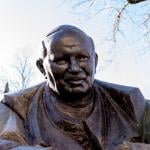BRAD IN NEW YORK ASKS:
Did Jesus have a personal theology? When did he change from Jew to Christian (if indeed he was a Christian)?
THE GUY SAYS:
Thanks a heap, Brad. Just kidding. Religion Q and A loves to get mind-boggling — or should we say mind-blogging — puzzlers. A few points on a highly complex topic:
The Guy posed this query to a relatively liberal Catholic, John P. Meier at the University of Notre Dame, author of A Marginal Jew: Rethinking the Historical Jesus (4-volume series, 1991-2009). Meier defines theology as “ordered, systematic articulation of the understanding of one’s faith” and on that basis says “I do not think we can speak of Jesus’ theology,” though he admits others might differ. As Meier implies, the Jesus we know from the New Testament did not talk like some theology professor. Yet if not a systematic theologian, he’d have shared the accepted 1st Century Jewish concepts of God’s person, attributes, deeds, moral will, and revelation.
If Jesus was a devoted though unconventional Jew, was he also a “Christian”? Darrell Bock of Dallas Theological Seminary tells Religion Q and A that “Jesus was never a Christian in the technical sense.” The label seems anachronistic, since Christianity was not a definable movement or institution till after Jesus’ crucifixion and resurrection.
Unpeeling Brad’s onion further, the theological tenets Christians added to that Jewish faith center chiefly upon the person of Jesus himself. We know that Jesus was worshipped as divine very soon after his earthly life. Larry Hurtado of the University of Edinburgh explores that history in Lord Jesus Christ: Devotion to Jesus in Earliest Christianity (2003).
Moving backward, did Jesus himself believe he was the messiah? Conservatives like Bock work from the only available 1st Century evidence, the four Gospels, whose historical reliability is regularly pooh-poohed by liberal and skeptical scholars. Bock, the author of Who Is Jesus?: Linking the Historical Jesus with the Christ of Faith (2012), says Jesus “showed his messianic self-understanding” in key passages like Luke 7:18-23 (similarly in Matthew 11:2-6). An emissary asks Jesus on behalf of the imprisoned John the Baptist, “Are you he who is to come, or shall we look for another?” Jesus says to tell John that “the blind receive their sight, the lame walk, lepers are cleansed, and the deaf hear, the dead are raised up, the poor have good news preached to them.”
We now know Jesus was saying he is the messiah by quoting a messianic job description that existed among Jews prior to his time, as found in the second wave of Dead Sea Scrolls. James Tabor, religion chair with the University of North Carolina at Charlotte (no conservative), was the first expert to announce the importance of 4Q521. This fragment states that God, working through the coming messiah, “restores sight to the blind… He will heal the wounded, and revive the dead, and bring good news to the poor”. That’s a translation by Geza Vermes of Oxford University, who observes that the link of the kingdom of God with healing and resurrection is a striking parallel with Jesus’ later New Testament teaching.
Then, did Jesus also believe he was the divine Son of God? No, contend Jewish specialists like Vermes (Christian Beginnings) and liberal Christians like Rudolf Bultmann (Jesus Christ and Mythology). Muslims also say no, of course, though the Quran agrees with the New Testament in exalting Jesus as a miracle-working, virgin-born “messiah,” a major prophet, and the “word of God.”
Bock insists that at his Sanhedrin trial and elsewhere Jesus “saw himself inseparably linked to the position of the Father.” N.T. Wright of the University of St Andrews says in the anthology The Incarnation (2002) that the whole tenor of Jesus’ teaching shows he “believed himself called to do and be things which … only Israel’s God, YHWH, was to do and be.” Wright adds the astonishing thought that the human Jesus “held this belief both with passionate and firm conviction and with the knowledge that he could be making a terrible, lunatic mistake.”
The writers mentioned above join countless others across 19 centuries who’ve tried to comprehend the phenomenon that is Jesus Christ, the most influential and most intriguing person in history — that’s a journalist’s solidly fact-based assessment.












